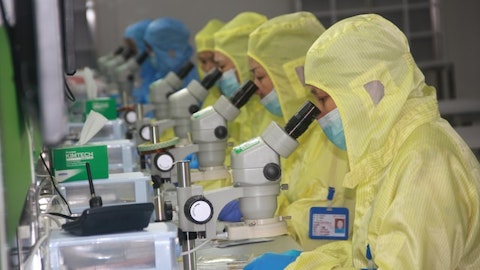Jennifer Good: David and I are looking at each other because we can both answer this. I’ll give a couple of comments and then let David comment. I mean, fundamentally, I think at the end, not only sort of what everybody saw in the briefing book and listening to the meeting, but we also followed up with KLL at our own advisory Board to make sure we weren’t missing something. Think fundamentally, the Merck drug just didn’t have good enough efficacy to clear the hurdles and got hung up in the primary endpoint didn’t correlate with the pros, etc. So I think at the end of the day, that was it, I would say, and then I’ll let David comment. The other takeaway that I certainly had from listening to the adcom was just how compelling the patient stories were about how disruptive RCC is to their lives.
That made a huge impact on me. And I think you heard it from the panel, and you heard it from the FDA say that they recognize that, that is — it’s a serious disease. Having watched that journey over the last five years when there was some debate about was this a real sort of condition. I think that ships clearly sailed. I left that call feeling that the FDA has bought in and the patients did a really good job of making the case. So David, from the drug developer, what do you hear?
David Clark: I agree with what you’ve said. The only pieces I would add two points. I think effect side, what we hope will be a differentiating factor for our program is the effect side. If we get a translation from the effect side, we saw in the IPF cough population in the RCC population when we’ll see in Phase 2a and hopefully, subsequent studies. So we think that will be a differentiator really protecting us and what happened to that Merck program, as you said, Jennifer. The only other piece I’d add, there are so many learnings you were aware of it from the Bellus now GSK program that are in place, I think, also as a field, a lot of the KOLs were reflecting to us. A lot of lessons have been learned from these multiple programs being run, which we utilize. Hopefully, we’re successful in Phase 2a and RIVER and we’re expanding into the larger studies. There’s a lot of good learnings to be — which are to our advantage.
Jennifer Good: Yes. It’s never easy to be the first guy over the wall in a new condition. So — but it makes our job easier for sure.
Serge Belanger: Thank you.
Jennifer Good: Thank you, Serge.
Operator: [Operator Instructions] Our next question comes from Mayank Mamtani with B. Riley Securities. Please go ahead.
Unidentified Participant: Hi. This is actually William on for Mayank here. Thank you for taking our questions and congratulations on the nice year end quarter. On your Phase 2a RIVER and HAP trials, do you plan on announcing full enrollment or last patient dose to give some refinement as the time frame expectations surrounding these readouts? And should we expect the HAP trial to read out first, given that it’s already over 50% enrollment? I have a couple of follow-ups.
Jennifer Good: Yeah. Thank you for the questions, William. I think what you should expect is, we’ll let people know when the study initiates, we’ll give guidance around what we think the top line data readout is. I think we’ll also let people know when we hit the 50% enrollment mark so that investors and analysts will know whether we’re on sort of the front end of enrollment or the back end of enrollment and we would announce last patient in, that’s a pretty big milestone. So what we’re going to avoid doing is, update by update of sort of where we are in enrollment, that just gets painful all around for everybody. So that’s our current thinking.
Unidentified Participant: That’s helpful. And a quick follow-up on that, with the falling potentially so close to each other, the readouts, both in second half ’24, what are your plans on meeting with the FDA to discuss next steps? And specifically for the HAP trial, do you and possibly having some discussion on REMS or some of the regulatory sort of put into place given the readout here, how should we be looking at that and would that be one meeting? And then with — and I’m missing those will be sort of incorporated into the next trials going forward?
David Clark: Correct. So our current thinking is we’re doing the preparations right now with experts in the abuse liability field, so that we are ready when that data comes in to really expect to interrogate it with them and get their expert opinion. And then with that, you’re quite right, then make our decisions, okay, what do we think is the logical next steps for any further discussion with the regulators, so that’s what we’re currently planning.
Jennifer Good: And probably, David, goes into, at a minimum the end of Phase 2 discussion around IPF, right? Because that will be a defined meeting. I think whether we choose to do something separate from that, it’s probably really only relevant if there’s something in the data we want to flag. So I would expect, William, at the end of Phase 2 meeting for IPF, we’ll bundle all that up and probably discuss it then.
Unidentified Participant: Okay. No. That’s…
Jennifer Good: I didn’t answer your question. By the way, I remember that you had asked which we thought would come first. And you’re right. I think with the HAP study only needing 56 subjects and we’re more than 50% enrolled. I imagine that trial will report out first.


